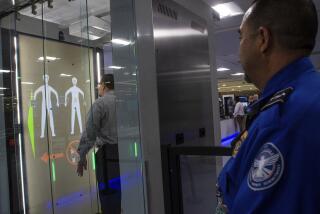TSA removes ‘nude scanners’ from airports
- Share via
The “nude scanners” are gone.
The full-body scanners that used X-rays to create what looks like a nude image of passengers have been packed away and removed from airports across the country. The 250 or so machines were removed about two weeks ago, before the June 1 deadline set by Congress.
But privacy advocates aren’t satisfied, noting that the Transportation Security Administration is still using full-body scanners that employ a different technology.
“They’ve never made a case that these scanners are better than using metal detectors or swabs to detect the use of explosives,” said Marc Rotenberg, executive director of the Electronic Privacy Information Center, a research center that sued the TSA in 2010 over the use of all full-body scanners.
QUIZ: Test your knowledge about airport security
The TSA now relies solely on millimeter wave scanners, which previously generated similar nude images but have been upgraded to portray a generic figure on which they point out objects concealed on travelers’ bodies. The scanner is made by New York-based L-3 Communications.
The X-ray scanners made by Torrance-based Rapiscan were removed after Congress required all airport scanners to use privacy-protecting software, such as the technology used by L-3. Rapiscan did not create the software for its X-ray scanners.
Rotenberg said he worries that the L-3 scanners may also be creating and keeping digital images of passengers. “There are lingering questions about whether the millimeter wave devices are retaining images,” he said.
A TSA spokesman said the scanners are programmed not to retain digital images.
ALSO:
LAX doesn’t land on list of world’s 100 best airports
Airline passenger asks for $170,550 over spilled coffee
TSA finds a record 65 weapons on airport travelers in a week
More to Read
Inside the business of entertainment
The Wide Shot brings you news, analysis and insights on everything from streaming wars to production — and what it all means for the future.
You may occasionally receive promotional content from the Los Angeles Times.











